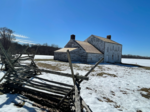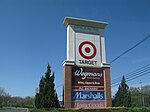Craig House (New Jersey)
American Revolution on the National Register of Historic PlacesAmerican Revolutionary War museums in New JerseyAmerican Revolutionary War sitesFreehold Township, New JerseyHistoric district contributing properties in New Jersey ... and 5 more
Historic house museums in New JerseyHouses in Monmouth County, New JerseyNRHP infobox with nocatNational Register of Historic Places in Monmouth County, New JerseyParks in Monmouth County, New Jersey

The Craig House is a restored Revolutionary War era farmhouse. In June 1778, it was used by the British Army as a hospital during the Battle of Monmouth. It is one of many 18th century farmhouses that have been preserved at Monmouth Battlefield State Park. The Craig House is located in Freehold Township in Monmouth County, New Jersey. Monmouth Battlefield is administered by the New Jersey State Park Service.
Excerpt from the Wikipedia article Craig House (New Jersey) (License: CC BY-SA 3.0, Authors, Images).Craig House (New Jersey)
Schibanoff Lane,
Geographical coordinates (GPS) Address External links Nearby Places Show on map
Geographical coordinates (GPS)
| Latitude | Longitude |
|---|---|
| N 40.274611111111 ° | E -74.297416666667 ° |
Address
Craig House
Schibanoff Lane
07728
New Jersey, United States
Open on Google Maps








